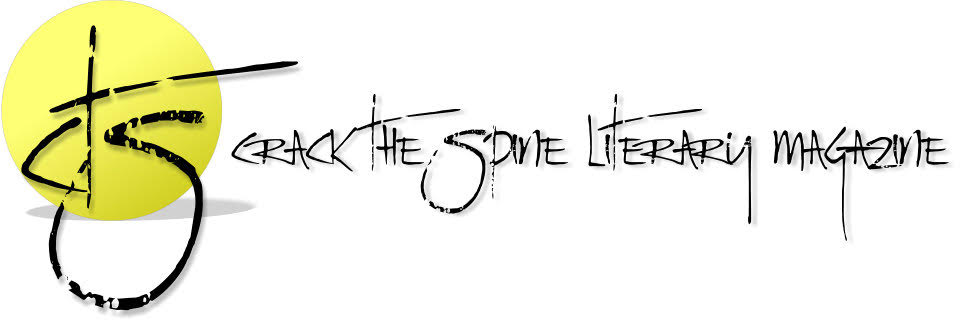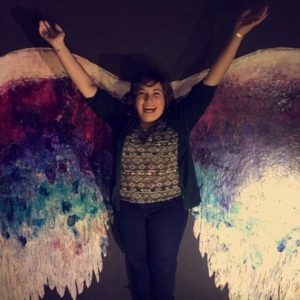Location: Washington, D.C.
Education: I majored in journalism and minored in creative writing at the University of Maryland. I also graduated from the Jiménez-Porter Writers’ House, where I received a great background in diverse international poetry and made friends who I still ask for writing feedback from.
The Writer
How long have you been writing?
I wrote my first story, a fable, in third grade, called “How the Dog Got its Bark.” It was a rip-off of “The Lion King,” where Rafiki was actually a magical elephant that helps a little puppy learn to speak. I’ve been improving (I hope) since then, and definitely not plagiarizing anymore.
Do you write full-time?
I write for my day-job and as a poet. I’m a marketing specialist at Society for Science & the Public, a science nonprofit that offers science fairs for students, grants for teachers to bring STEM to underserved youth, and publishes several science publications. I’m so grateful that I get to write blog posts, newsletters, and email campaigns for work. Writing is my love, so being able to write at work and poetry and short stories at night makes me happy and keeps me alive.
What do you consider to be your greatest accomplishment as a writer?
I am incredibly proud that I had my first collection published before I turned 30. I don’t think it’s a race or a competition, but it’s been something I’ve wanted for a long time. My collection, On that one-way trip to Mars, focuses on my skeletal dysplasia and space exploration. It is a space journey that includes sexual encounters with astronomers, the increasing warmth of the sun, and zero gravity to give aching bones a break.
What is your greatest challenge as a writer?
As a disabled writer, it can be hard to attend conferences, festivals, travel for book tours, etc. I have chronic pain which can be invisible to others, but very present for me. So it’s a lot about listening to my body and understanding what I need in the moment. I do push myself to attend great events like Split This Rock’s poetry festival, AWP, workshops, open mics, and more because it is so vital to have diverse voices represented. The panels I speak on at these events often focus on the disabled body and how to build inclusive writing communities, and having these conversations continues to be one of my goals and dreams.
The Work
Tell us about your work in Crack the Spine.
“Ilana and the science experiment” is a short story about a young girl who gets her period. She’s worried that becoming a woman will be like tossing salt on a slug, an irrevocable experience that will change her forever.
Is there a main theme or message in this piece?
As a woman writer, I actively work to subvert gender stereotypes, sexism, and structures like the patriarchy. I think my poetry is more effective, but short stories offer more room to build a voice. I don’t think periods should be taboo. I don’t think women should be ashamed of our bodies — and including a transgender character was not done lightly. I wanted to address the intersections we all face in life, that womanhood, and puberty, and growing up bring out. I try to embrace my body, even amidst all the pain it’s in, and spread that throughout my writing.
How long did it take you to complete this piece?
I tend to write the majority of my flash or short stories in one sitting, going back to revise later. Conclusions are the most difficult parts of a story for me, so I fiddle around with different endings. I like to read my work aloud to test how different sentence structures and endings feel.
Tell us about another project you have published or are currently working on.
My first collection of poetry, On that one-way trip to Mars, was published by Bottlecap Press. I’m too short for NASA’s height restrictions, so I channeled that frustration into poetry that explores living with a bone disorder and chronic pain. I am also currently working on another collection.
The Methods
How often do you write?
I try to write daily, finding small moments to carve out time like during my commute.
What time of day or night makes you most productive as a writer?
I’m definitely a night-owl. When I’m actively working on a project, I sometimes stay up way too late, but that’s when my ideas seem to flow best.
How many drafts do you generally go through before you consider a piece to be complete?
I constantly revise. I read my work aloud to help know when it sounds most polished. I don’t stick to a set number of drafts, and the number varies for individual poems versus an entire collection. Getting feedback and critique from a workshop group or friends I trust is invaluable. Sometimes, it seems like a poem or story is never finished and can always be improved, but I’ve found it best to trust when it’s time to walk away and be proud of it.
How do you react to editorial rejections of your work?
I try to welcome rejections; that means I’m submitting work and doing my best to get published. Submitting can be a full-time job, in addition to writing and my full-time job. So when I receive a rejection, form or with promising feedback, I know I’m putting in the necessary effort. It’s hard, but it keeps pushing me.
What is your best piece of advice on how to stay sane as a writer?
Try to build your own writing community. Find local or online writing workshops, open mics, join a literary magazine, read diverse books. I find that staying in conversation about writing with a diverse group of people helps me stay in a creative mindset. Also, this quote by artist Marshall Vandruff helps so much: “One reason that people have artist’s block is that they do not respect the law of dormancy in nature. Trees don’t produce fruit all year long, constantly. They have a point where they go dormant. And when you are in a dormant period creatively, if you can arrange your life to do the technical tasks that don’t take creativity, you are essentially preparing for the spring when it will all blossom again.”
The Madness
What is your favorite book?
It’s a tie between Fahrenheit 451 by Ray Bradbury and Life on Mars by Tracy K. Smith. When I first read Bradbury’s take on the future, entertainment, and censorship, I knew that this book was very different. Books had stuck with me before, but this one seeped in and became a part of my internal organs. It was a necessary book. Bradbury writes with such fervor, such honesty in his language that even fantastical elements seem real. He also writes with poetry — some of his most memorable moments can be boiled down to a line, an image. And Tracy K. Smith’s collection of David Bowie, space travel, music poetry is an obsession. It is a collection of grieving, for our lonely planet, for human existence, for the death of her father, who worked on the Hubble Space Telescope.
What is your favorite word?
Aurora borealis.
What makes you laugh?
Stupid puns.
Rain or Sunshine?
Summer sunshine.
Chocolate or Vanilla?
Chocolate, of course!
Beer or Wine?
Neither, tea.
Additional Reading on Marlena


great interview! enjoyed this writer’s perspectives.
Inciteful interview with Marlena’s answers delving deep into her inner feelings. Marlena expresses her thoughts in a smooth flow of words with an openness and honesty which tends to draw the reader in looking for more.